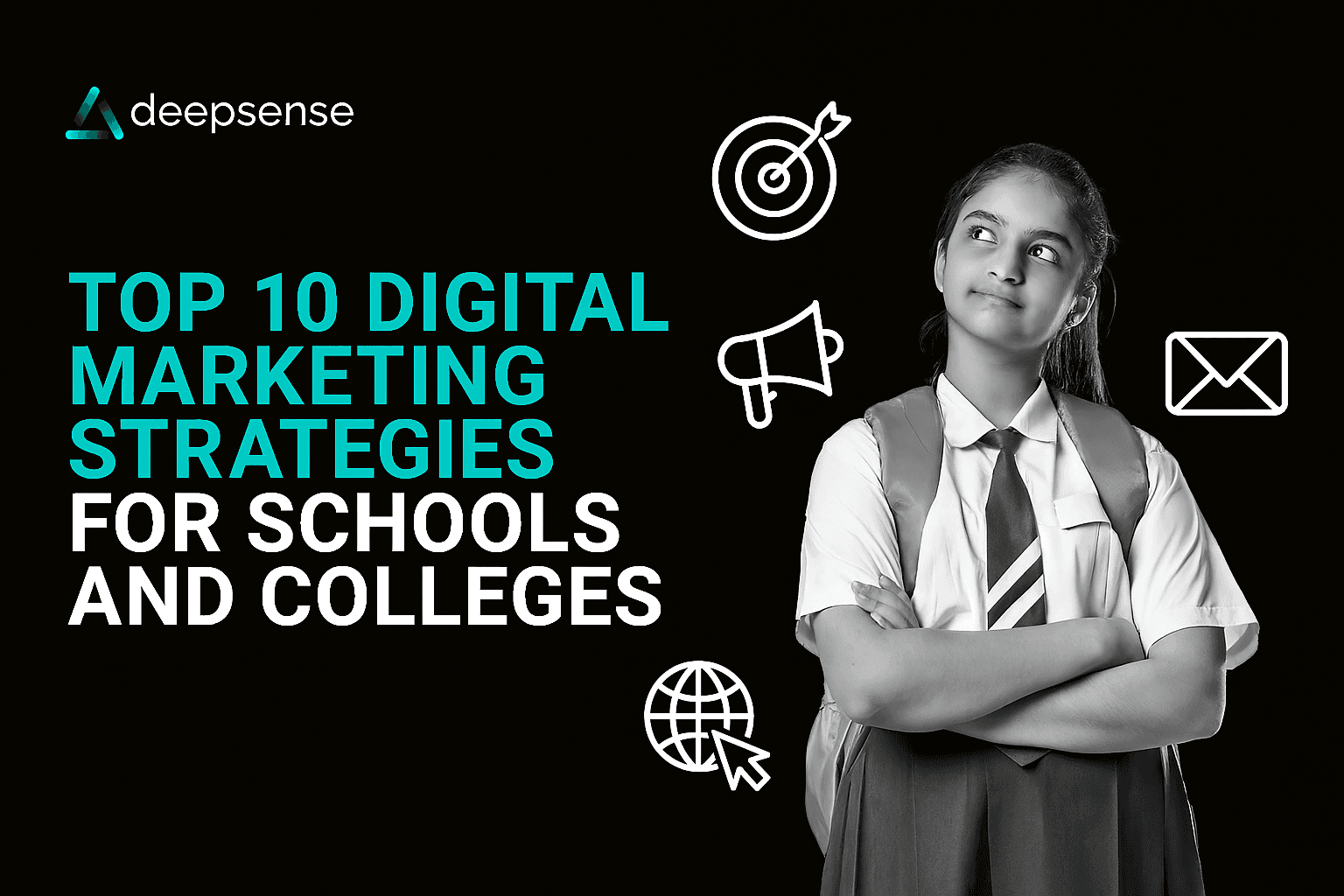Because today’s students don’t just enroll, they explore first.
Introduction:
In a world where every decision starts with a search engine and a scroll, education is no exception.
Today’s parents and students don’t just look for a school or college, they research, compare, review, and validate before even picking up the phone or scheduling a visit. So whether you run a traditional school, an international curriculum institution, or a modern college offering specialized degrees, your first impression is digital.
That means your online presence isn’t just “good to have”, it’s the new open house.
But here’s the good news: with the right digital marketing agency, even the smallest institutions can build a big presence. Let’s walk through the Top 10 Digital Marketing Strategies that can help schools and colleges not just survive, but thrive in the digital age.
1. Develop a Modern, Mobile-Friendly Website – Your Digital Front Office
A school or college website should be more than a digital brochure, it should be your online admissions desk.
What it must include:
Clear navigation
Course/grade offerings with details
Faculty profiles with credentials
Virtual campus tours or photo galleries
Online inquiry forms
Admission FAQs and deadlines
Downloadable brochures
Career and placement info (for colleges)
Why it matters: 80% of parents will visit your website before ever contacting you. A poor, outdated, or slow website can turn away interested families in seconds.
Bonus: Make sure your site is optimized for mobile devices, most parents and students browse on their phones.
2. Invest in SEO to Appear When People Search
Let’s face it, if you’re not showing up on Google, you’re invisible.
Search Engine Optimization (SEO) helps your institution appear when people search for terms like:
“Top CBSE school in Anna Nagar”
“Best MBA college in Bangalore with placement”
“Affordable ICSE schools near me”
How to get started:
Use location-based keywords
Write blog posts on educational topics
Optimize page titles, URLs, and meta descriptions
Add your school/college to Google Maps and local directories
Tip: Consider creating separate landing pages for each campus, course, or stream.
3. Create a Strong Social Media Presence – Tell Your Story Daily
Your school is more than a place to study, it’s a community. Social media helps you narrate your journey in real-time.
What to post:
Student achievements
Campus events
Teacher spotlights
Alumni success stories
Daily life on campus
Event countdowns & admission alerts
Platforms to focus on:
Facebook & Instagram for student life and parent engagement
LinkedIn for alumni, faculty, and corporate tie-ups
YouTube for lectures, tours, testimonials, and events
Pro Tip: Assign a content coordinator or hire an agency to maintain consistency in storytelling.
4. Run Smart, Targeted Paid Ads
Paid digital ads allow you to hyper-target your message to the right people at the right time.
Examples:
Facebook/Instagram Ads: “Admissions Open for Class XI – Limited Seats!”
Google Search Ads: “Top Commerce College in Pune | Enroll Now”
YouTube Ads: “Take a 60-second campus tour – Virtual Open House now live!”
Ad targeting:
By location (10–15 km radius)
By age (parents 30–50 or students 16–25)
By interests (education, careers, college admissions)
Why it works: Digital ads give measurable results, impressions, leads, conversions. You can scale based on performance.
5. Create Useful, Engaging Content – Be the Educator Before They Enroll
You’re in the business of education. Use content marketing to teach before they trust.
Types of content:
Blog posts (“5 Things Every Parent Should Know Before Grade 1”)
Videos (“Day in the Life of a B.Sc. Student”)
Webinars (“How to Pick the Right Stream After Class 10”)
Downloadable Guides (“Complete Admission Checklist”)
Email newsletters with academic tips and updates
Bonus: This content also improves your SEO and positions your institution as a thought leader in education.
6. Use Video to Build Trust & Showcase Culture
People don’t want to just read about your institution, they want to see it and feel it.
Video is your digital walkthrough, and it builds more trust than text or images alone.
Types of videos to create:
Virtual tours of the campus
Teacher interviews and philosophies
Student testimonials and parent reviews
Annual day, sports events, fests
Placements, internships, and alumni interviews
Curriculum explainer animations
Platforms: YouTube, Instagram, Facebook, LinkedIn, Website
Remember: Use subtitles, keep it short (under 2 mins), and add strong CTAs.
7. Enable Real-Time Engagement with WhatsApp & Chatbots
Parents and students have questions, and they want instant answers.
Use:
WhatsApp Business API to send course brochures, fee details, and reminders
Chatbots on your website for 24/7 help (“Ask about campus life or admission criteria!”)
Why this helps: Reduces load on admin staff and increases lead conversion by responding immediately.
8. Encourage Positive Reviews & Testimonials Online
Before applying, parents and students check:
Google reviews
Facebook ratings
Justdial or Shiksha.com feedback
Quora threads and Reddit discussions
Ask happy students, alumni, and parents to leave reviews after admissions, results, or successful events. Share them as Stories, highlights, or in a “Student Voice” section on your website.
Why this works: Reviews are the modern word-of-mouth. They influence decisions more than advertisements.
9. Host Virtual Events, Webinars, and Instagram Live Q&As
Virtual events are the new open houses.
Ideas include:
“Meet the Principal” Instagram Live
“Career Guidance After Class 12” webinars
“Parent Orientation – What to Expect” Zoom sessions
“Ask Us Anything” Instagram Stories with admission teams
Promote them ahead of time, collect registrations, and follow up via email with resources or recordings.
Why this works: You build rapport, clear doubts, and engage interested leads in real time.
10. Email Marketing – Nurture Your Leads Over Time
Not every inquiry leads to an instant enrollment. Stay top-of-mind by nurturing leads via email.
Send:
Admission reminders
Fee deadlines
Program announcements
Blog and webinar invites
Stories of student success
Use segmentation (parents, students, alumni) and automation tools like Mailchimp, Zoho, or ConvertKit to personalize your outreach.
Pro Tip: Make your emails valuable, not just promotional.
Conclusion: Turning Searchers Into Students
Your institution might have a stunning campus, brilliant faculty, cutting-edge labs, and an impressive alumni network, but if people can’t find you online, you don’t exist in their decision-making process.
Digital marketing doesn’t replace quality education, it amplifies it.
It helps your vision, values, and excellence reach the right families at the right time.
So don’t think of digital marketing as a trend.
Think of it as your admissions accelerator, brand builder, and community connector.
The schools and colleges of the future won’t just have smart classrooms.
They’ll have smart marketing strategies that bring those classrooms to life online.
FAQs
1. Why do schools and colleges need digital marketing?
Today’s parents and students search for educational institutions online. Digital marketing helps you build a strong online presence, improve your visibility in local searches, build trust through reviews and testimonials, and guide potential students through the admission funnel, all while showcasing your academic strengths and campus life.
2. What are the best digital platforms for promoting educational institutions?
The most effective platforms include:
Google (for search visibility and local SEO)
Facebook & Instagram (for engagement with parents and students)
YouTube (for campus tours, testimonials, and event highlights)
LinkedIn (for faculty achievements, alumni success, and professional visibility)
3. How can SEO help increase student admissions?
SEO (Search Engine Optimization) ensures your school or college appears in relevant online searches like “top CBSE schools in Mumbai” or “best BBA college in Delhi.” By optimizing your website with the right keywords, content, and structure, you attract organic traffic from families actively looking for education options.
4. What kind of content should a school or college post online?
Institutions should post:
Campus photos and virtual tours
Faculty spotlights
Student achievements and testimonials
Event highlights (annual day, sports meets, etc.)
Blog articles on career guidance or academic tips
Admission updates and deadlines
Content should be informative, authentic, and engaging.
5. Are paid digital ads effective for school or college admissions?
Yes. Paid ads on platforms like Google, Facebook, Instagram, and YouTube help target specific audiences based on location, age, interests, and behaviors. They’re especially effective during admission seasons when families are actively researching institutions.
6. How do video marketing and virtual tours help in student recruitment?
Videos create emotional connection and trust. A well-produced video showing your campus, classroom interaction, student life, and alumni stories gives prospective students and parents a real feel of your institution, even before they visit in person.
7. Can WhatsApp and chatbots be used for school/college marketing?
Absolutely. WhatsApp Business and website chatbots provide instant support for FAQs like course details, fees, or deadlines. This improves response time and helps convert inquiries into actual leads.
8. How important are online reviews for educational institutions?
Very important. Over 85% of parents and students trust online reviews as much as personal recommendations. Positive Google and Facebook reviews from alumni, parents, and students boost credibility and play a huge role in decision-making.
9. How often should a school or college post on social media?
Ideally, 3–5 times a week. Consistent posting keeps your community engaged and your institution top of mind. A mix of reels, carousels, photos, testimonials, and stories can help maintain variety and impact.
10. What is the ROI of digital marketing for schools and colleges?
Digital marketing provides measurable ROI through:
Increased website visits
Higher number of qualified inquiries
Better brand recall
Greater conversion during admission season
Compared to traditional ads, digital campaigns are cost-effective, trackable, and offer better targeting options.











